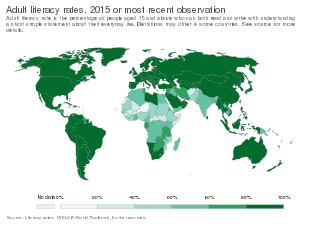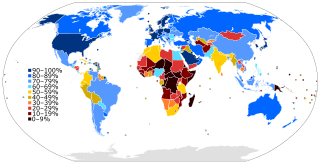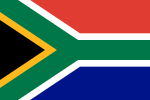
Literacy is the ability to read and write. Some researchers suggest that the study of "literacy" as a concept can be divided into two periods: the period before 1950, when literacy was understood solely as alphabetical literacy ; and the period after 1950, when literacy slowly began to be considered as a wider concept and process, including the social and cultural aspects of reading and writing and functional literacy.
The digital divide is the unequal access to digital technology, including smartphones, tablets, laptops, and the internet. The digital divide worsens inequality around access to information and resources. In the Information Age, people without access to the Internet and other technology are at a disadvantage, for they are unable or less able to connect with others, find and apply for jobs, shop, and learn.
Media literacy is an expanded conceptualization of literacy that includes the ability to access and analyze media messages, as well as create, reflect and take action—using the power of information and communication—to make a difference in the world. Media literacy applies to different types of media, and is seen as an important skill for work, life, and citizenship.
The global digital divide describes global disparities, primarily between developed and developing countries, in regards to access to computing and information resources such as the Internet and the opportunities derived from such access.

Information and communications technology (ICT) is an extensional term for information technology (IT) that stresses the role of unified communications and the integration of telecommunications and computers, as well as necessary enterprise software, middleware, storage and audiovisual, that enable users to access, store, transmit, understand and manipulate information.
M-learning, or mobile learning, is a form of distance education or technology enhanced active learning where learners use portable devices such as mobile phones to learn anywhere and anytime. The portability that mobile devices provide allows for learning anywhere, hence the term "mobile" in "mobile learning." M-learning devices include computers, MP3 players, mobile phones, and tablets. M-learning can be an important part of informal learning.

The history of education in Africa can be divided into pre-colonial and post-colonial periods. Since the introduction of formal education by European colonists to Africa, education, particularly in West and Central Africa, has been characterized by both traditional African teachings and European-style schooling systems.
Education in Kenya refers to the institutionalised education system in Kenya, whereby pupils and students are taught in specific locations, following a particular curriculum. The institutionalised system differs from traditional education which had been in existence long before missionarisation and colonisation, and was administered according to the various indigenous groups' cultures and customs.

Digital literacy is an individual's ability to find, evaluate, and communicate information using typing or digital media platforms. It is a combination of both technical and cognitive abilities in using information and communication technologies to create, evaluate, and share information.
Bibliothèques Sans Frontières (BSF), known as Libraries Without Borders (LWB) in English, is a charitable organisation based in France that provides access to information and education for those who need it most, whether refugees in humanitarian crises or under-resourced communities in the developed world. Founded in 2007, the organization distributes books, develops innovative technologies, creates customized programs, and builds digital learning platforms in more than 50 countries, including Colombia, Cameroon, Bangladesh, France, and the United States. The U.S. branch, opened in 2008, is based in Washington, D.C., and listed as a non profit 501(c) organization under U.S. law. The organization received the Library of Congress' International Literacy Award in 2016.

The Internet in Africa is limited by a lower penetration rate when compared to the rest of the world. Measurable parameters such as the number of ISP subscriptions, overall number of hosts, IXP-traffic, and overall available bandwidth are indicators that Africa is far behind the "digital divide". Moreover, Africa itself exhibits an inner digital divide, with most Internet activity and infrastructure concentrated in South Africa, Morocco, and Egypt, as well as smaller economies like Mauritius and the Seychelles. In general, only 43% of the African population has access to the Internet as of 2021. Only 0.4% of the African population has a fixed-broadband subscription. The majority of internet users use it through mobile broadband.

The term digital citizen is used with different meanings. According to the definition provided by Karen Mossberger, one of the authors of Digital Citizenship: The Internet, Society, and Participation, digital citizens are "those who use the internet regularly and effectively." In this sense, a digital citizen is a person using information technology (IT) in order to engage in society, politics, and government. Digital Citizenship refers to the responsible use of technology and the internet. It involves following ethical norms and practices when engaging online, ensuring that individuals contribute positively to the digital world.
The National Book Trust of Uganda (NABOTU), founded in 1997, is a non-government organization that brings together associations and institutions within Uganda's book sector to promote authorship, publishing and a culture of reading in Uganda.
Worldreader is a 501(c)(3) global nonprofit organization working with partners to get children reading at least 25 books a year with understanding.
A knowledge society generates, shares, and makes available to all members of the society knowledge that may be used to improve the human condition. A knowledge society differs from an information society in that the former serves to transform information into resources that allow society to take effective action, while the latter only creates and disseminates the raw data. The capacity to gather and analyze information has existed throughout human history. However, the idea of the present-day knowledge society is based on the vast increase in data creation and information dissemination that results from the innovation of information technologies. The UNESCO World Report addresses the definition, content and future of knowledge societies.

Bonny Norton,, is a professor and distinguished university scholar in the Department of Language and Literacy Education, University of British Columbia, Canada. She is also research advisor of the African Storybook and 2006 co-founder of the Africa Research Network on Applied Linguistics and Literacy. She is internationally recognized for her theories of identity and language learning and her construct of investment. A Fellow of the American Educational Research Association (AERA), she was the first recipient in 2010 of the Senior Research Leadership Award of AERA's Second Language Research SIG. In 2016, she was co-recipient of the TESOL Award for Distinguished Research and elected a Fellow of the Royal Society of Canada.
The African Storybook (ASb) is a multilingual literacy initiative that works with educators and children to publish openly licensed picture storybooks for early reading in the languages of Africa. An initiative of Saide, the ASb has an interactive website that enables users to read, create, download, translate, and adapt storybooks. The initiative addresses the dire shortage of children's storybooks in African languages, crucial for children's literacy development. As of March 2023, the website had 3 800 original titles, 7 266 translations and 236 languages represented.
Educational technology in sub-Saharan Africa refers to the promotion, development and use of information and communication technologies (ICT), m-learning, media, and other technological tools to improve aspects of education in sub-Saharan Africa. Since the 1960s, various information and communication technologies have aroused strong interest in sub-Saharan Africa as a way of increasing access to education, and enhancing its quality and fairness.

Media pluralism defines the state of having a plurality of voices, opinions, and analyses in media systems or the coexistence of different and diverse types of medias and media support.

SDG 4, or Sustainable Development Goal 4, is a commitment to ensure inclusive and equitable quality education and promote lifelong learning opportunities for all. This goal aims to provide children and young people with quality and easy access to education, as well as other learning opportunities, and supports the reduction of inequalities. The key targets of SDG 4 include ensuring that all girls and boys complete free, equitable, and quality primary and secondary education, increasing the number of youth and adults who have relevant skills for employment, and eliminating gender disparities in education.










